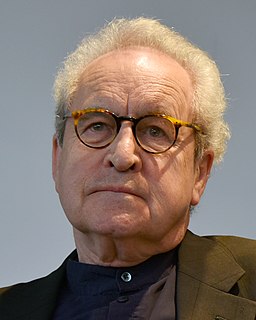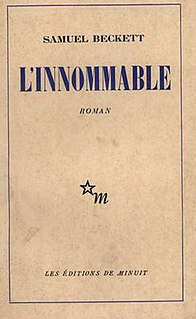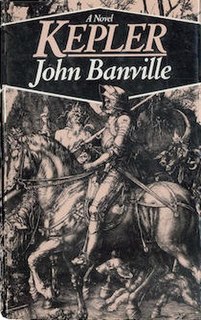Related Research Articles

Samuel Barclay Beckett was an Irish novelist, playwright, short story writer, theatre director, poet, and literary translator. A resident of Paris for most of his adult life, he wrote in both French and English.

Waiting for Godot is a play by Samuel Beckett in which two characters, Vladimir (Didi) and Estragon (Gogo), engage in a variety of discussions and encounters while awaiting the titular Godot, who never arrives. Waiting for Godot is Beckett's translation of his own original French-language play, En attendant Godot, and is subtitled "a tragicomedy in two acts". The original French text was composed between 9 October 1948 and 29 January 1949. The premiere, directed by Roger Blin, was on 5 January 1953 at the Théâtre de Babylone, Paris. The English-language version premiered in London in 1955. In a poll conducted by the British Royal National Theatre in 1998/99, it was voted the "most significant English language play of the 20th century".
In literary criticism, stream of consciousness is a narrative mode or method that attempts "to depict the multitudinous thoughts and feelings which pass through the mind" of a narrator. The term was coined by Daniel Oliver in 1840 in First Lines of Physiology: Designed for the Use of Students of Medicine, when he wrote,
If we separate from this mingled and moving stream of consciousness, our sensations and volitions, which are constantly giving it a new direction, and suffer it to pursue its own spontaneous course, it will appear, upon examination, that this, instead of being wholly fortuitous and uncertain, is determined by certain fixed laws of thought, which are collectively termed the association of ideas.
This article contains information about the literary events and publications of 1981.

William John Banville is an Irish novelist, short story writer, adapter of dramas and screenwriter. Though he has been described as "the heir to Proust, via Nabokov", Banville himself maintains that W. B. Yeats and Henry James are the two real influences on his work.

Lost in the Funhouse (1968) is a short story collection by American author John Barth. The postmodern stories are extremely self-conscious and self-reflexive and are considered to exemplify metafiction.
Anthony Gerard Richard Cronin was an Irish poet, arts activist, biographer, commentator, critic, editor and barrister.

Molloy is a novel by Samuel Beckett first written in French and published by Paris-based Les Éditions de Minuit in 1951. The English translation, published in 1955, is by Beckett and Patrick Bowles.

The Unnamable is a 1953 novel by Samuel Beckett. It was originally published in French as L'Innommable and later translated by the author into English. Grove Press published the English edition in 1958.
Deirdre Bair was an American literary scholar and biographer. She won a National Book Award for her biography of Samuel Beckett in 1981.

Company is a novella by Samuel Beckett, written in English and published by John Calder in 1979. It was translated into French by the author and published by Les Éditions de Minuit in 1980.
Dan Greenburg is an American writer, humorist, and journalist. His 73 books have been published in 20 languages in 24 countries.

Footfalls is a play by Samuel Beckett. It was written in English, between 2 March and December 1975 and was first performed at the Royal Court Theatre as part of the Samuel Beckett Festival, on May 20, 1976 directed by Beckett himself. Billie Whitelaw, for whom the piece had been written, played May whilst Rose Hill voiced the mother.
"Worstward Ho" is a prose piece by Samuel Beckett. Its title is a parody of Charles Kingsley's Westward Ho!. Written in English in 1983, it is the penultimate novella by Beckett.

The "fizzles" are eight short prose pieces written by Samuel Beckett:
Samuel Beckett wrote the radio play, Words and Music between November and December 1961. It was recorded and broadcast on the BBC Third Programme on 13 November 1962. Patrick Magee played Words and Felix Felton, Croak. Music was composed especially by John S. Beckett. The play first appeared in print in Evergreen Review 6.27. Beckett himself translated the work into French under the title Paroles et Musique.
Nohow on is a collection of three prose pieces by Samuel Beckett, comprising Company, Ill Seen Ill Said, and Worstward Ho. It was first published in one volume in 1989.
All Strange Away is a short prose text by Samuel Beckett first published in English in 1964. A special signed edition with illustrations by Edward Gorey was published in 1976, and in a trade edition by Grove Press of collected texts titled, Rockaby and Other Short Pieces in 1981. Beckett's British publisher, John Calder, also printed the work independently in 1979 and again, in 1990, in a collection of late prose works under the title, As the Story was Told.

Kepler is a novel by John Banville, first published in 1981.

Samuel Beckett: Anatomy of a Literary Revolution is a 1997 book by French literary critic Pascale Casanova about the Nobel Prize-winning Irish playwright, novelist and poet Samuel Beckett. She contends that rather than the representative of literary existentialism that he is popularly understood to be, Beckett is best viewed as a creator of a highly autonomous form of literature, that is, a literature that is largely devoid of external references. The book was published in English translation in 2006.
References
- ↑ Beckett, Samuel (1981). Ill seen ill said. Internet Archive. New York : Grove Press. ISBN 978-0-394-52233-3.
- ↑ "Ill Seen Ill Said". The New Yorker. 1981-09-28. Retrieved 2022-05-13.
- ↑ Frost, Everett C.; Banville, John. "'Ill Seen Ill Said' | John Banville". ISSN 0028-7504 . Retrieved 2022-05-13.